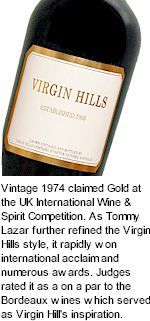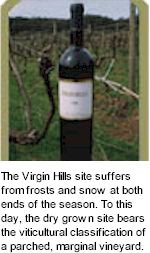About Virgin Hills - the Winery
Virgin Hills
It is a wonder that Virgin Hills exists at all. It certainly should never have become what some of Australia's most respected wine critics have nominated as their desert island wine
Virgin Hills was the creation of eccentric Hungarian Australian sculptor restaurateur Tom Lazar. Arriving from Paris in the mid 1960s, he found a new country with a food and wine industry, very different to the one we know today. Lazar was determined to change all that. He established the renowned Little Reata restaurant in Melbourne. Then in 1968, came his grand vision of Virgin Hills. Inspired, he bought 300 acres of rugged bushland high in the Macedon Ranges. Lazar saw an opportunity to expose Australian palates to something very different; black cherries. After laborious clearing, the soil revealed itself to be quite poor for the purpose. Swiftly, Lazar had another grand vision.

Decades before the term cool climate styles of wine became popular, he abandoned the idea of a cherry orchard, planting Cabernet Sauvignon, Shiraz, Malbec, Merlot and Pinot Noir instead. He planned an Australian rival to the great Bordeaux wines he had grown to love in Paris. Lazar was prone to grand visions. Of course, we scarcely need mention that Lazar had no grape growing or winemaking experience whatsoever. After spending a vintage in the Coonawarra under the instruction of Owen Redman, Lazar produced the first Virgin Hills vintage. A blend of all the varieties in the vineyard, it stood out among Australian wines as being uncharacteristically subtle.
Tom had great success with his early vintages, 1974 claimed Gold at the UK International Wine & Spirit Competition in 1981. This catapulted Virgin Hills into the spotlight. As Lazar refined Virgin Hills further, it rapidly won international acclaim and numerous awards. Judges worldwide rated it as a worthy competitor to the Bordeaux wines that inspired it. A marked contrast to the standard oaky Australian red, Virgin Hills won a devoted following, particularly in Victoria.
Virgin Hills Estate is at Lauriston, 15km west of Kyneton in Victoria's Macedon Ranges. The altitude of the vineyard is 600 metres above sea level, making it one of Australia's most elevated sites. The vineyard is carved out of dense eucalyptus bushland. The soils classic profile is that of friable red/brown topsoil overlying medium red clay soil, which holds moisture in from winter rains. To this day, it bears the viticultural classification of marginal vineyard.

Underneath all those layers of soil are decomposed silty sandstone, which allows for good through drainage, essential for premium fruit. The soil has well balanced structure allowing for deep root penetration, which the old unirrigated vines thrive on. The vines are all dry grown. Winter rainfall fills the soil with water for the dry summer months. The land suffers from frosts and occasional snow at both ends of the season (budburst and harvest time).
By far the most challenging aspect of the high altitude vineyard is frost control. Frosts commonly appear in the vineyard in spring and even summer. For this reason Virgin Hills was planted with a northerly aspect, on steep sloping hillside, providing maximum air drainage. Virgin Hills has always had a low grape yield (0.5 to 1.5 tonnes per acre), this is largely due to the tough climactic conditions and the dry grown grapes. Only one wine has ever been produced under the Virgin Hills label. From the beginning, the blends have varied subtly from year to year, adding to its mystique. In 1979 Marcel Gilbert bought Virgin Hills. During 18 years of ownership, his commitment to the integrity of the wine was legendary. Tom Lazar remained as winemaker until 1983, when the reins were handed over to Mark Sheppard.
In 1998, Virgin Hills was briefly acquired by a publicly listed company. It is now back under family ownership following its purchase by Michael Hope, a pharmacist turned vigneron. Michael has been successfully producing premium wine in the Hunter Valley since 1997. He leads a talented team of people who cherish Virgin Hills' spirit of individualism. The future is bright for a wine that has achieved greatness against the predictions of many. Proof, more than three decades on, of the power of a grand vision.
